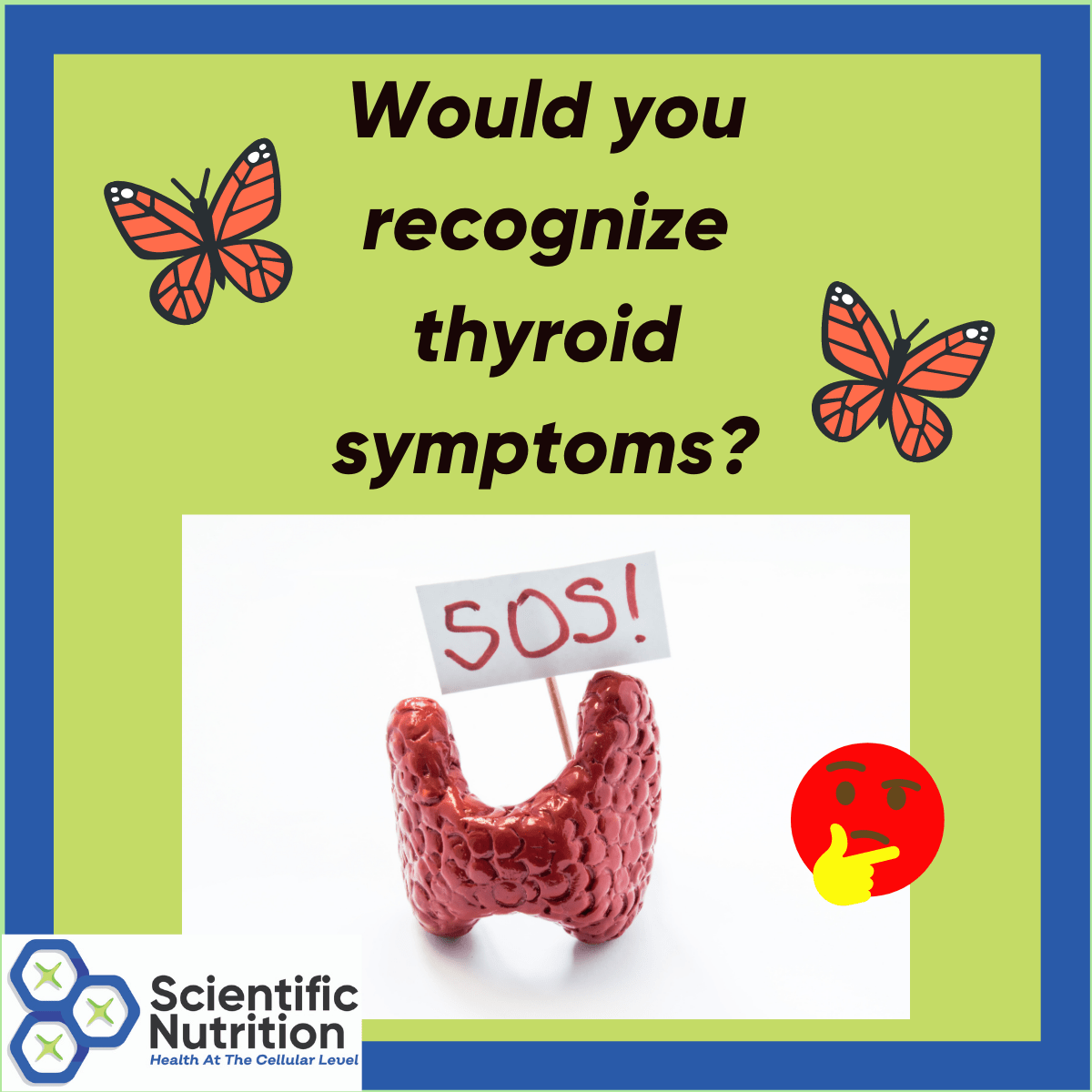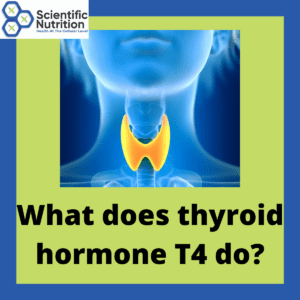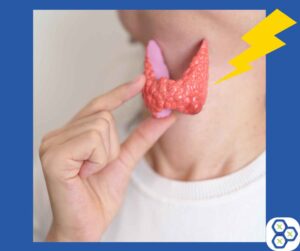What does the thyroid do for you?
Your thyroid does more than you think!. It is an organ that looks like a shield (literally derived from the Greek word) or butterfly in the front of your windpipe. It has many functions that can affect your whole body that you might not have connected to the thyroid. If your thyroid is healthy it produces and is responsible for the following:
- 80% of your T4 or thyroxine
- 20% of your T3 or triiodothyronine (energy)
- Calcitonin hormone helps to reduce blood calcium levels
- Regulating your body’s energy levels
- Breathing
- Muscle strength
- Menstrual cycles
- Body temperature (hot/sweat easily or cold extremities with little sweating)
- Speed of digestion
- Cholesterol levels
- Heart rate
- Bodyweight
- Central and peripheral nervous systems
There are many malfunctions that can cause symptoms including goiters, cancer, and nodules which are less common.
What’s wrong with my thyroid?
Thyroid issues may include hyperthyroidism (fast), hypothyroidism (slow), and thyroiditis (inflamed).
Let’s explore the 3 most common conditions related to issues with the thyroid.
Hyperthyroidism
This condition is caused by too much thyroid hormone. Goiter is sometimes a side effect of hyperthyroidism. This is due to an over-stimulated thyroid and inflamed tissues.
Common symptoms of hyperthyroidism or excess T3 and T4 include:
- Trembling hands
- Nervousness or hyperactivity
- Hair loss
- Shortness of breath
- Heat intolerance or sensitivity
- Heart palpitations
- Diarrhea
- Panic attacks
- Dry brittle hair
- Insomnia
- Weight loss
- Rapid heart rate
- Flushing or hot flashes
- Increased appetite
- Menstrual irregularities
- Exercise intolerance
- Excessive hunger
- Anxiety
- Sweating or sensitivity to high temperatures
- Irritability or moodiness
- Light or absence of menstrual periods
- Vision changes/bulging eyes
Hypothyroidism
This is a common condition caused by a deficiency of thyroid hormone. Hypothyroidism often goes unnoticed, possibly for years, before being diagnosed. In infants, the condition is known as cretinism which has very serious side effects, including abnormal bone formation and mental retardation. If one has slow or hypothyroidism it may indicate a deficiency of T3 and T4 hormones.
Common and possible thyroid symptoms of hypothyroidism:
- Weight gain
- Sensitivity to cold temperatures in extremities
- Low body temp (not 97.8 in the morning)/cold skin
- Lack of appetite
- Insomnia/non-restful sleep
- Joint and/or muscle pain
- Tiredness, fatigue in the morning after sleep
- Dry skin/scaling and hair
- Cracked heels
- Itchy scalp or possible eczema
- The skin around the eyes seems thick
- Lower legs can thicken/swollen ankles
- Swelling of eyelids
- Short of breath
- Depression
- Vision issues
- Numbness/tingling
- Hearing loss
- Dizziness
- Night sweats
- Sparse or loss of the outer eyebrow
- Difficulty concentrating
- Brain fog/slow cognitive thinking
- Low heart rate
- Food allergies
- Heavy or frequent menstrual periods
- Anxiety
- Low sex drive
- Poor memory
- Rashes or acne (also heavy metal toxicity)
- Oversized tongue
- Ridges down fingernails (Iron too)
- Puffy/pale or yellowish skin or bloated face
- Brittle/Dry/Fine Hair
- Reliance on stimulants (sugar, caffeine, cigarettes)
- Infertility or impotence
- Constipation & slow digestion
- Poor fingernail growth/quality
- Menstrual irregularity/heavy or painful
- Obsessive thinking
- Difficulty swallowing
- Pale lips
- Slow speech
- Heart palpitations
- Chronic pain or muscle aching
- Ability to sleep anytime or in any place
Thyroiditis
This is an inflammation in the thyroid gland due to abnormal thyroid function (in particular hyperthyroidism). The inflammation causes the thyroid’s cells to die, making the thyroid unable to produce enough hormones to maintain the body’s normal functions.
It can be caused by types of disease triggering your immune system to attack the thyroid gland by a virus or bacteria causing inflammation thus damaging the thyroid cells. Commonly this occurs when it is an autoimmune disease, such as Hashimoto’s Disease. It can also be triggered by the use of radiation or medications.
Common and possible thyroid symptoms of thyroiditis may include:
- Weight loss
- Nervousness or irritability
- Muscle weakness
- Tremors (shaking hands or fingers)
- Excess sweating
- Heat intolerance or feeling cold
- Diarrhea frequently
- Water retention
- Weight gain or weight loss
- Abnormal protrusion or puffy eyes
- Anxiety or irritability
- Insomnia
- Rapid heart rate
- Fatigue
- Menstrual irregularities
- Muscle weakness
- Fast heart rate
- Cold sensitivity
- Dry skin and hair
- Enlarged thyroid
- Sexual dysfunction
- Under or overactive thyroid
As you can see there are many as well as overlapping symptoms involved in the malfunction of the thyroid and its processes. I will be taking a closer look at additional blogs to explain the role, as well as the importance of your hormones, including TRH, TSH, T4, Free T4, Reverse T4, T3, Free T3, and Reverse T3 levels.
Hair Analysis and possible thyroid symptoms
There are also multiple organs that are involved in the stimulating, production, and facilitation of these necessary hormones. It is important to dig deeper to see the overall cellular functions of the thyroid. Finding the break in the process of making energy or where the disconnect is happening with the hormones may go deeper than a simple TSH level.
By using a Hair Mineral Analysis w can look at causes that may be stopping you from enjoying the best quality of health possible.
LET’S CHAT about your health goals!
Check out the next blog explaining the process from your brain to your energy level.
Learn more about where the thyroid process begins.
Copyright Scientific Nutrition, LLC 2021




